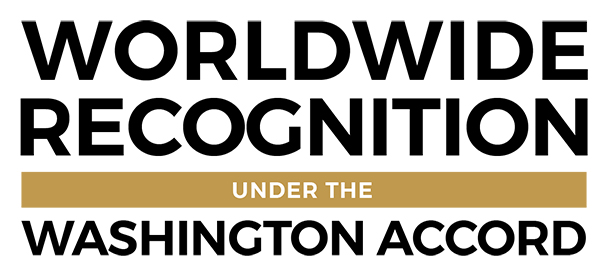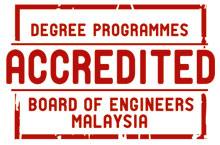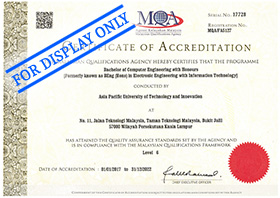You are here
Bachelor of Computer Engineering with Honours

|
|
|
APU-DMU DUAL DEGREE PROGRAMME
|
INTERNATIONAL RECOGNITION - ENGINEERING DEGREES ACCREDITED UNDER THE WASHINGTON ACCORD
APU Engineering Degrees are fully accredited by the Board of Engineers Malaysia (BEM) which is a signatory to the Washington Accord.
For more information, please click HERE. |   |
ADMISSION REQUIREMENTS
| GENERAL REQUIREMENTS | |
| DIRECT ENTRY TO LEVEL 1 OF THE DEGREE: | |
| STPM | • 2 Passes in STPM with a minimum Grade C (GP 2.0) in Mathematics and Physics (or Chemistry), and a Credit in Mathematics and Physics (or Chemistry) at SPM Level or its equivalent. |
| A-LEVEL | • 2 Passes (Grade A-D) in A-Level including Mathematics and Physics (or Chemistry). |
| UEC | • 5 Grade B’s in UEC, including Mathematics and Physics (or Chemistry). |
| MATRICULATION/ FOUNDATION | • Passed the relevant Foundation programme (minimum CGPA of 2.0) with a Credit in Mathematics and Physics (or Chemistry) at SPM/O-Level/IGCSE or equivalent. |
| ENTRY TO LEVEL 2 OF THE DEGREE: | |
| DIPLOMA | • Successful completion of the APU/APIIT Engineering Diploma and fulfilment of requirements for Credit Transfer, subject to the approval of the APU Academic Board OR • Successful completion of a Diploma in Engineering with other recognised Institutions and fulfilment of requirements for Credit Transfer, subject to the approval of the APU Academic Board. |
Any qualification that APU accepts as equivalent to the above.
Candidates who wish to study Engineering Degree course must not be color blind or physically handicapped which makes him/her unable to conduct experimental/practical work and affect the learning process leading to potential errors towards professional practice as well. This is in line with the requirements of engineering professional bodies where safe engineering practices is mandatory. All International Students need to go through EMGS Medical Screening, if the student is found to be color blind; the Medical Screening maybe failed.
| ENGLISH REQUIREMENTS | |
INTERNATIONAL STUDENTS | • IELTS : 5.0 |
PROGRAMME EDUCATIONAL OBJECTIVES
- Be a practicing engineer contributing to the development of Computer or Electronic Engineering while demonstrating professionalism.
- Pursue engineering innovation via career advancement opportunities and/or advanced studies in Computer or Electronic Engineering.
Computer engineering has emerged as a driving force addressing numerous global demands like smart grids, cognitive buildings, energy management and the likes. Operating platforms for more and more applications have been migrating to the cloud in recent days. Bridging the gap between hardware and software, are Computer Engineers, advancing computer technology towards transforming more and more of these cyber dreams into realities. Some of the areas covered in this major are:
|
|
PROGRAMME LEARNING OUTCOMES
The students, upon completion of their study, should attain the following outcomes:
| PLO1 | Ability to gain and apply principles of Mathematics, Science and Engineering to the solutions of complex engineering problems. |
PLO2 | Ability to undertake complex engineering problem analysis and apply engineering principles to solve them. |
PLO3 | Ability to design innovative solutions for complex engineering problems. |
| PLO4 | Ability to investigate complex engineering problems using research techniques. |
| PLO5 | Ability to select and use suitable tools and techniques for complex engineering problems. |
| PLO6 | Ability to engage in professional engineering practice for safety, health, social, cultural and legal responsibilities in developing solutions for complex engineering problems. |
| PLO7 | Ability to comprehend and demonstrate good practices of engineering in sustainable development and environmental considerations for the solutions of complex engineering problems. |
| PLO8 | Ability to execute the responsibilities of an Engineer professionally and ethically. |
| PLO9 | Ability to function effectively as a team leader or a member in a team within multi-disciplinary settings. |
| PLO10 | Ability to communicate effectively and professionally on complex engineering activities. |
| PLO11 | Ability to demonstrate entrepreneurship skills, engineering project management and economic decision making in multidisciplinary environments. |
| PLO12 | Ability to recognise the need for, and be able to engage in independent and life-long learning towards continuous professional development. |
PROGRAMME OUTLINE
This programme is specifically designed to provide students with:
- High-quality undergraduate engineering education by providing students with a curriculum that is firmly grounded in Computer engineering fundamentals.
- A study in the area of computer engineering which covers networking, database management, security systems, cloud infrastructure and data analytics.
DEGREE YEAR 1 |
Students will understand the basic principles of engineering in the areas of Circuit Analysis, Instrumentation & Measurement, C Programming, Programming with Python, Engineering Materials, Engineering Design and Networking. Other modules aim to provide the basic demands of employers, as well as thorough grounding in principles of IT and entrepreneurship. Important and relevant skills for managing activities and for their own independent learning are also introduced.
COMMON MODULES | |
|
|
SPECIALISED MODULES | |
| |
DEGREE YEAR 2 |
HereHere, students start specialising in modules that develop the necessary underlying knowledge and skills in Computer Engineering with modules such as Electromagnetic Field Theory, Engineering Software & Applications, Analogue Electronics, Digital Electronics, Signals & Linear Systems, Introduction to Electrical Systems, Object Oriented Development with Java, Programming Concepts in C++ and Human Computer Interaction. Engineering Mathematics is provided for better understanding of the engineering modules.
COMMON MODULES | |
|
|
SPECIALISED MODULES | |
|
|
DEGREE YEAR 3 |
Specialised knowledge and skills in the areas of Control Engineering, Communication Engineering Principles, VLSI Design, Microprocessor Systems and Embedded Software, Digital Signal Processing, Modern Communication Systems and Machine Vision & Intelligence are the critical focus of this level. There is further development of the ability to apply relevant engineering skills with strong critical thinking and analysis. Independent learning continues in all modules.
COMMON MODULES | |
|
|
SPECIALISED MODULES | |
|
|
IN THE 2ND SEMESTER OF YEAR 3 MINOR/EXTENSION PATHWAY (CHOOSE 1) | |
| |
INTERNSHIP (16 WEEKS) |
Students will undertake an Internship/Industrial Training for a minimum period of 16 weeks to prepare them for a smooth transition from the classroom to the working environment.
DEGREE YEAR 4 |
The final year Engineering modules provide the necessary industry application and technological skills which become very useful for employment upon graduation. Students’ personal and professional development, technical capability and understanding of how to innovate, generate and manage the creation of new ideas will be enhanced. Students will deliver several Engineering Projects where they will demonstrate higher level critical thinking, analysis and solutions development skills which will enhance their employability.
COMMON MODULES | |
|
|
SPECIALISED MODULES | |
|
|
MINOR/EXTENSION PATHWAY (CONTINUATION) | |
| |
COMPUTER ENGINEERING MINOR/EXTENSION PATHWAYS
Future Proof Engineers for the Real World
In APU, employment and it’s continual sustainability is of paramount importance to us. The range of minor and extensions offered to all students within the School of Engineering will craft a formidable way forward for the young aspiring engineers of tomorrow. These options allow students to embark on a journey of exploration either within the engineering fraternity by extending into greater depth (extensions) niche knowledge, skills and attributes required for the practice of contemporary engineering or explore wider options (minor) that are pivotal in the fundamental proliferation of the engineering profession as a while when coupled with other current multidisciplinary fields of expertise. Successful completion of either pathways future proof the students allowing them to embark on a journey of rewarding careers within an engineering discipline of their choice.
Minor Pathway – Gain breadth of knowledge by taking 3 set modules outside of a particular major field of study. There are minor packages available undertaken from Year 3 Semester 2 Year 4 Semester 1 and Year 4 Semester 2.
MINOR PATHWAY | ||||
NAME OF MINOR | Year 3 Semester 2 | Year 4 Semester 1 | Year 4 Semester 2 | |
Digital Age Psychology | Industrial & Organizational Psychology | Cyberpsychology | Human Factors Psychology | |
Extension Pathway – Expand depth of knowledge by taking three (3) set modules in a specific area within a certain field of study. There are extensions available undertaken from Year 3 Semester 2, Year 4 Semester 1 and Year 4 Semester 2.
EXTENSION PATHWAY | ||||
NAME OF EXTENSION | Year 3 Semester 2 | Year 4 Semester 1 | Year 4 Semester 2 | |
Cloud Computing | Designing and Developing Applications on Cloud | Cloud Infrastructure and Services | Emergent Technology | |
IoT | Knowledge Discovery and Big Data Analytics | Internet of Things: Concepts and Applications | Emergent Technology | |
FinTech | FinTech Governance, Risk Management & Compliance | Digital Finance | Robo Advisor | |
Digital Transformation | Digital Execution | Digital Strategy & Analytics | Emergent Technology | |
Data Analytics | Knowledge Discovery and Big Data Analytics | Behavioral Science and Marketing Analytics | Optimization & Deep Learning | |
Artificial Intelligence | Machine Vision Intelligence (MVI) | Text Analysis & Sentiment Analysis | Emergent Technology | |
MQA COMPULSORY SUBJECTS* |
|
|
(*All students are required to successfully complete these modules as stipulated by the Malaysian Qualification Agency.) | |
CAREER OPTIONS
|
|
COURSE FEES
Malaysian Students | International Students |
Year 1: RM 28,200 | Year 1: RM 31,600 (USD 7,350) |
* Fees stated here do not include Deposits and other Miscellaneous Fees. Please refer to Fee Guide for details.
MQA ACCREDITATION
(R3/0713/6/0016)(02/29)(MQA/FA5127) |
| All information is correct at the time of publication, but is subject to change in the interest of continuing improvement. |
Engineering Degree Programmes |



